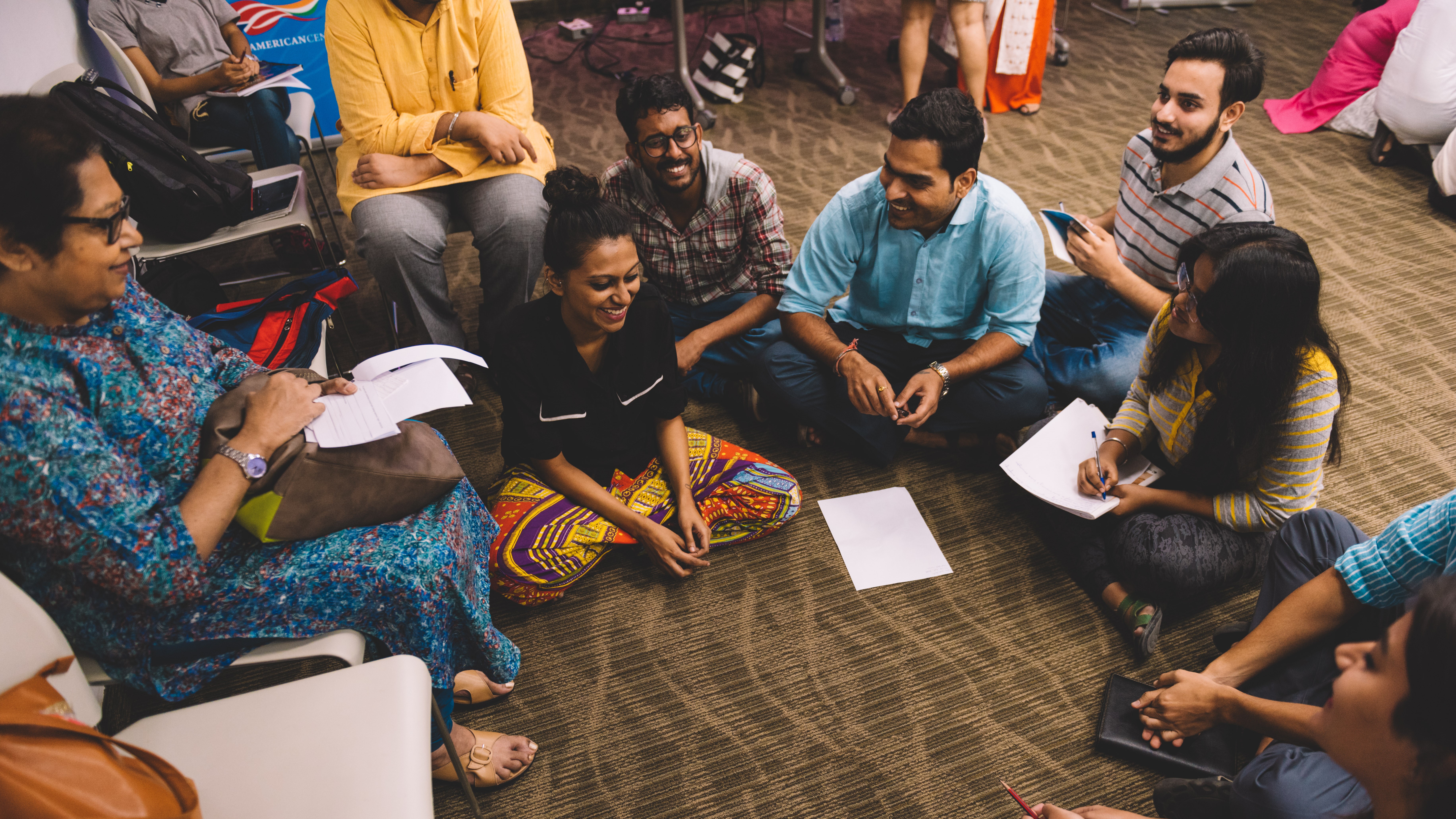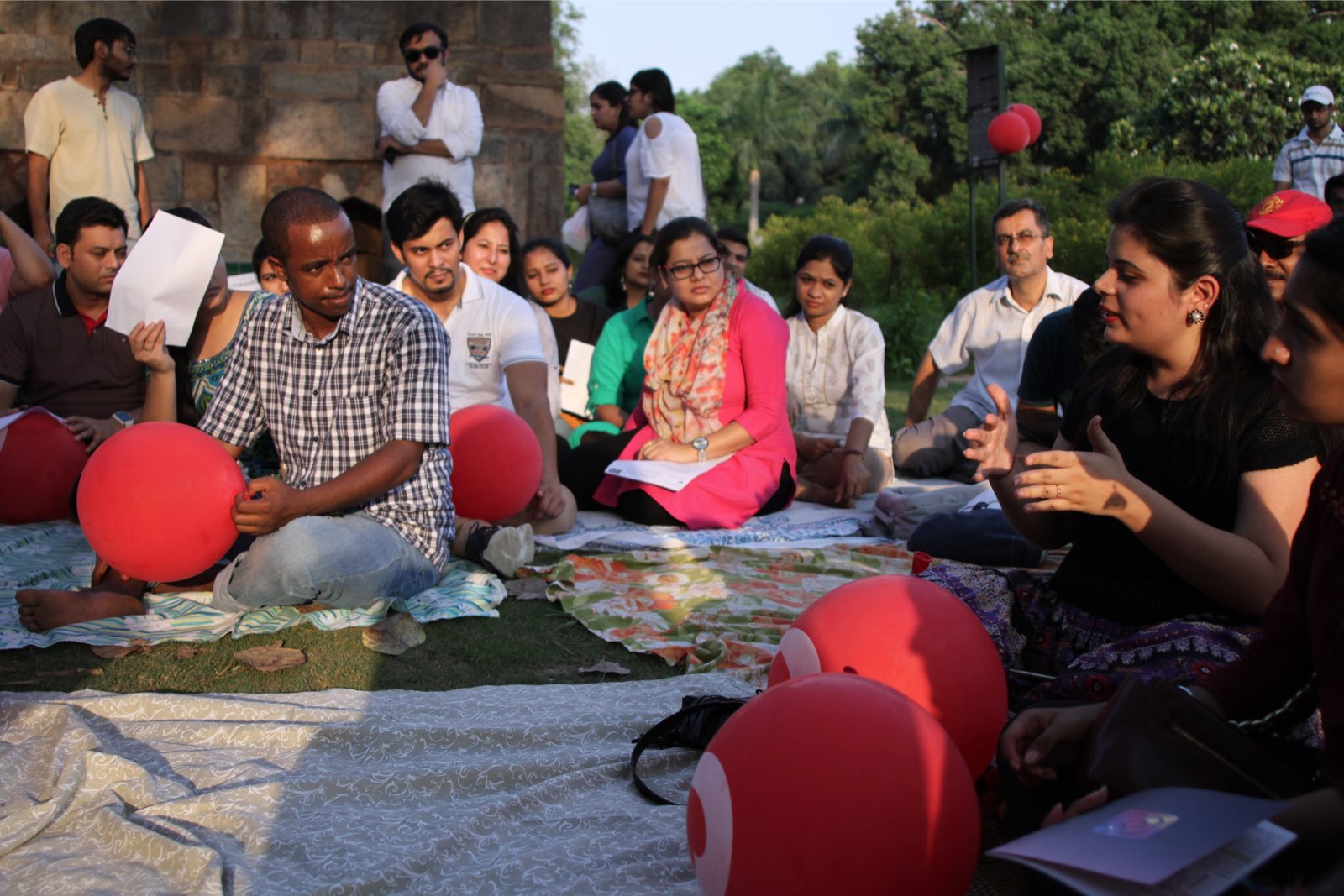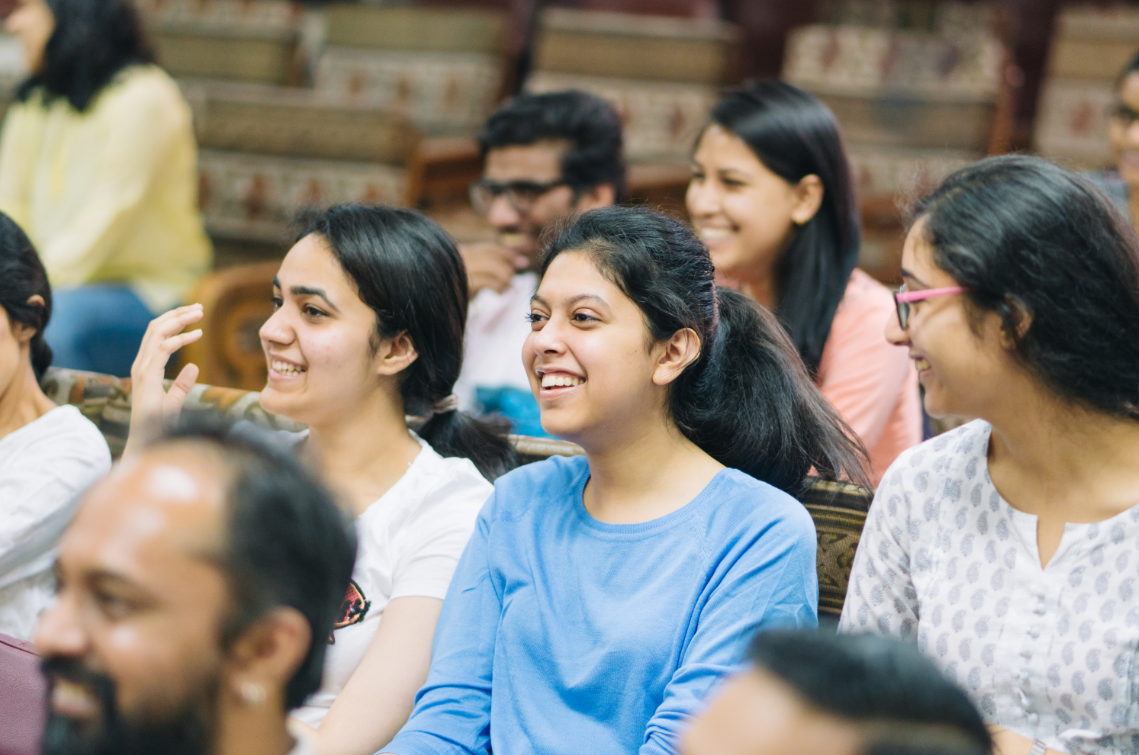It’s OK to Talk is an adolescent and youth-focused programme started in 2016, which aims to increase awareness about mental health and wellbeing, so that more young people feel able to engage in dialogue on mental health, and seek help. It’s Ok to Talk was India’s first youth-focused mental health campaign and it was co-designed with young people.

Participants at a mental health awareness workshop at the American Centre, on World Mental Health Day, in Delhi. Image: It’s Ok to Talk.
The It’s OK to Talk programme comprised three core activities:
- The It’s Ok to Talk website
- A programme of events and workshops
- A social media campaign (Facebook, Twitter and Instagram)
The programme was lead through four main collaborators: Sangath (not-for-profit NGO committed to improving health by empowering existing community resources), the Wellcome Trust, Harvard Medical School, and the London School of Hygiene and Tropical Medicine. The programme also worked in partnership with individual young people and a range of organisations that brought complementary expertise on community engagement, arts, and social media.
Aims and Objectives
Globally, 10-20% of the world’s youth (15-24 years old) are experiencing a mental health condition, and of these, 80% do not receive care (WHO, in It’s Ok to Talk Annual Report).
It’s Ok to Talk therefore aimed to overcome barriers faced by adolescents and young people in talking about mental health problems and seeking help.
Young people and adolescents were active stakeholders in the conceptualisation, design, and delivery of the It’s Ok to Talk engagement project. This was made possible through the creation of a Youth Advisors Group, which consisted of representative young people from schools and universities. Furthermore, to collaboratively build a strategy and set objectives, a national workshop was held with organisations working in mental health, life-skills development, gender and sexuality, social media, and the arts.
As a result, the programme’s objectives became to:
- Identify strategies to address the stigma associated with mental health amongst youths and adolescents
- Increase awareness on mental health issues amongst young people and adolescents
- Build capacity among youths and adolescents in India to address mental health problems
The team believe that talking about mental health is the first step to breaking stigmas attached to mental health and illness.
Activities & Findings
Website: It’s Ok to Talk
The It’s Ok to Talk website was designed to be a safe, online space where young people felt able to discuss and share stories and experiences around mental health. The site publishes real stories submitted by young people and has three key features: discover others’ stories, submit your own story, and find help (i.e. information and practical help). The site was designed as a ‘mobile-first’ site with the aim of overcoming issues of low bandwidth and limited Wi-Fi/Internet connectivity.
In just twelve months, 60 personal stories had been submitted to the site by young people and it had reached over 2000 users. Young people felt empowered by discussing and sharing stories through the site:
“Sharing my story through It’s Ok to Talk was one of the most cathartic and empowering things I have done for my mental health…It’s Ok to Talk became a safe space I realised I needed in order to allow myself to be as completely and entirely vulnerable as I could be, a wonderful platform to inspire and be inspired” (Student, 19, website contributor)
Attendees at the launch of It's Ok To Talk on World Health Day, 2017. Image: It’s Ok to Talk
Programme of Events and Workshops
The programme consisted of seven public events in its first year, to provide young people (with and without experiences of mental health problems) to learn and listen to each other, to challenge negative stereotypes and break down the stigma and discrimination associated with mental health. These included:
- A large public fair
- Music performances
- Theatre performances
- Audio-visual exhibition
- Talks and discussions
More than 1,800 young people were reached directly through these events. Through surveys completed by young people before, during, and after the events, the programme team ascertained that:
- Before one event*, 50% of those surveyed (492 people) did not know how to respond if a friend or family member faced a mental health problem
- After the event, 90% of those surveyed (80 people) reported that their attitude towards mental health was positively impacted, and 70% responded that they were more likely to seek help for a mental health challenge
*This event included de-stigmatising content, and an audio-visual exhibit featuring mental health stories and a series of short talks by mental health and youth advocates who talked about their journeys.

Puppet show on body positivity at the launch of It's Ok To Talk on World Health Day, 2017. Image: It’s Ok to Talk
The programme also consisted of training and workshops. The programme supported a youth organisation (YP Foundation) to design and pilot a workshop and curriculum development project, which focused on mental health and issues related to gender and sexuality. They also supported the Centre for Community Dialogue and Change (CCDC) to design, develop, and conduct a 13-day Forum Theatre Workshop for youth practitioners working with adolescents and youth in local organisations/NGOs through the arts, life-skills and education. Read more about the method of Forum Theatre here.
Social Media Campaign
Alongside the website and programme of events, the project also engaged in a series of social marketing activity. These included: live-streams, promoted videos, promoted posts and personal stories, and commissioned short video stories. The aim of the social media campaign was to inspire young people to get involved in the programme, as well as to keep supporters engaged between events.
It’s Ok to Talk had a large social media audience: over 450,000 people were reached through Facebook and Instagram, and their online videos were viewed 75,000 times.

A contributor shares her poem on mental health at the It's Ok To Talk and Instameet picnic for mental health focussed on kind comments. Image: It’s Ok to Talk
Learnings and Future Directions
The first year of the project was mostly in English, however going forward into the second year a wider reach will be achieved through expansion into Hindi. The project will be launching a Hindi version of the website in order to reach a wider youth audience.
They team are planning to start a pilot survey with social media followers in order to learn more about the impact of their engagement with the sites, as currently although there is a high-level of quantitative engagement, there is little evidence of the impact of this online activity.
The team will begin to look not only at changes in attitudes straight after events, but also long-term attitude and behaviour changes (e.g. over 3 – 6 months)
As well as a Youth Advisors Group, the team plan to recruit a Youth Advocates Group from across India to advise on community and social media work as well as design and conduct activities in their own communities. These advocates will also be trained to use effective evaluation tools for themselves.
Going forward, a greater number of events will be conducted in partnership with youth organisations and networks and will be more diverse in their remit including: community outreach events, puppet shows, art performances, and college and school awareness workshops.
Finally, the programme plans to further publicise low-cost help-seeking options including hospitals, helplines, self-help apps, etc., through social media channels.
Click here to go to the It’s Ok to Talk website
Click here to download the It’s Ok to Talk annual report
This work is licensed under a Creative Commons Attribution 4.0 International License



Please Sign in (or Register) to view further.